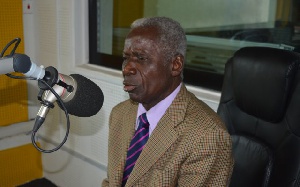The Government of Ghana should have given parliament prior notice about its intention to bring into the country, two former Guantanamo Bay detainees, who are now in Ghana for a two-year stay, former national security advisor Brigadier-General Joseph Nunoo-Mensah (rtd) has said.
“… I think what probably didn’t go right is that we didn’t give the information to the people. You see, you have to have an open government… we have a parliament which represents [the people], why not issue a statement to parliament and let them know two [ex-detainees of Guantanamo Bay are coming into the country]. You can’t call all Ghanaians, but at least they [MPs] are standing in for us, go and tell them this is what we are doing. There is nothing wrong with that,” Brig-Gen Nunoo-Mensah told Class91.3fm’s Executive Breakfast Show host Ekow-Mensah-Shalders on Wednesday March 9.
Bin Atef and Al-Dhuby were transferred to Ghana on January 7 following an agreement between President John Mahama and U.S. President Barack Obama. The issue caused uproar in Ghana. Many civil society organistions and Christian groups condemned the move and asked that the two be returned to the high security detention camp. The Minority in Ghana’s parliament also questioned why the president sprung a surprise on parliament.
Mr Mahama at a press conference defended his decision thus: “This is a matter of security, it’s not an international treaty, and, so, it’s not something that we were required to take to parliament and that’s why it didn’t go to parliament, but as I said, as commander-in-chief, I mean I stand to lose the most if I jeopardised the security of this nation, and, so, we did a lot of work, with our partners and I believe that the collaboration we are having with our international partners is positive. I cannot disclose everything, but we have got very good intelligence information and the risk to you is even worse than these detainees because you must be interested in what your children are doing.”
“Your children are probably being radicalised. One day, before you see, your son has set off to go and fight in Syria, and we’ve seen a few examples where young promising people have left home, even though we haven’t confirmed it, their behaviour falls into a certain pattern that shows that they probably have been radicalised, and we don’t have the network to be able to trace where they are, and, so, America and countries like that, we have submitted the names and they are helping us to locate where these people are and be able to tell what they are involved in, so that when they are coming back home, we can ask: ‘Where have you been, what have you done?’ And so these are some of the things that we are working on. …So, the threat goes beyond two detainees, who were arrested when they were 20 years old,” Mr Mahama said in response to a question from Class News’ Emefa Apawu at the Flagstaff House on Tuesday January 12, 2016, during a press briefing.
According to the Minority, however, the president breached the 1992 Constitution by sidelining parliament in the process of accepting the ex-detainees. Legislator Kweku Kwarten of Obuasi West Constituency said in an interview that: “If you go to article 75 of our constitution, specifically 75 (2), it says: (2) A treaty, agreement or convention executed by or under the authority of the President shall be subject to ratification by- (a) Act of Parliament; or (b) a resolution of parliament supported by the votes of more than on-half of all the members of parliament.”
“So, whether that agreement is written and signed by parties or whether President Obama makes a phone call and says: ‘We want to transfer two detainees to your country’ and President Mahama says: ‘Yes’, that constitutes an international agreement, and I take the view that this ought to have come to Parliament as a matter of constitutional requirement,” Mr Kwarten said.
“And the suggestion that it was a security matter, so, even if it was an agreement between their President and our President; and their government and our government; it ought not to have come to Parliament, is an unconstitutional view to take,” he argued on Friday January 15.
General News of Wednesday, 9 March 2016
Source: classfmonline.com

















